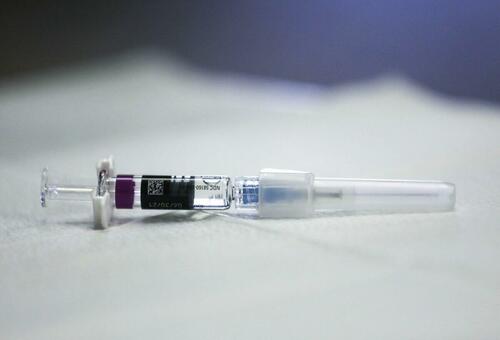Feds Start Enrolling Volunteers For mRNA Flu Vaccine Trial
Authored by Bill Pan via The Epoch Times (emphasis ours),
Vaccine developers at the National Institute of Allergy and Infectious Diseases (NIAID) are enrolling healthy adult Americans to test an experimental universal influenza vaccine using mRNA technology.
The Phase 1 trial will be conducted at Duke University in Durham, North Carolina, the NIAID said on Monday. Researchers will test the experimental vaccine, dubbed H1ssF-3928 mRNA-LNP, for safety and its ability to induce an immune response.
For this early-stage trial, the federal research agency is looking for up to 50 healthy volunteers aged 18 through 49. There will be three 10-participant groups receiving 10, 25, and 50 micrograms of the experimental vaccine, respectively. After evaluation of the data to determine an optimum dosage, an additional 10 participants will be administered with the optimum dosage.
The study also will include a group of participants to receive a currently available flu vaccine that protects against the four most common flu virus strains in circulation.
The NIAID said it expects to collect all the data needed by March 15, 2024, and conclude the study by Aug. 30, 2024.
The name H1ssF is an abbreviation of H1 hemagglutinin stabilized stem ferritin, meaning that the vaccine uses the “stem” part of the influenza hemagglutinin protein displayed on the surface of a ferritin nanoparticle as the immunogen. The “stem” remains largely unchanged throughout influenza mutations, as compared to the “head,” which constantly changes as the virus mutates into different strains in a process called “antigenic drift.”
Most of the body’s immune response to the influenza virus is directed toward the ever-changing “head” of the hemagglutinin protein, and hence seasonal influenza vaccines must be updated each year. NIAID researchers believe that a vaccine that targets the “stem” without the distraction of the “head” could offer stronger and longer-lasting immunity.
The other part of the experimental vaccine’s name, mRNA-LNP, means that the messenger RNA-encoded immunogen is delivered inside a lipid nanoparticle (LNP). The vaccine doesn’t contain the immunogen, but uses LNP-coated mRNA to instruct the host cells to assemble the immunogenic proteins that can trigger the production of effective antibodies.
Safety Risks
The same mRNA technology is used to make both Pfizer-BioNTech and Moderna COVID-19 vaccines, two of the most administered vaccinations in the world. Despite their widespread use, championed by governments of many countries under the premise that the shots are safe and effective, the mRNA vaccines continue to spur concerns about serious side effects, including a heightened risk of cardiac-related deaths in healthy teenagers and young adults after vaccination.
Last October, the Florida Department of Health issued a warning against giving young men mRNA COVID shots, citing an analysis (pdf) that found “an 84 percent increase in the relative incidence of cardiac-related death among males 18-39 years old” within 28 days following the jab.
“With a high level of global immunity to COVID-19, the benefit of vaccination is likely outweighed by this abnormally high risk of cardiac-related death among men in this age group. Non-mRNA vaccines were not found to have these increased risks,” said Dr. Joseph Ladapo, Florida’s surgeon general.
Read more here…
Tyler Durden
Thu, 05/18/2023 – 18:20

